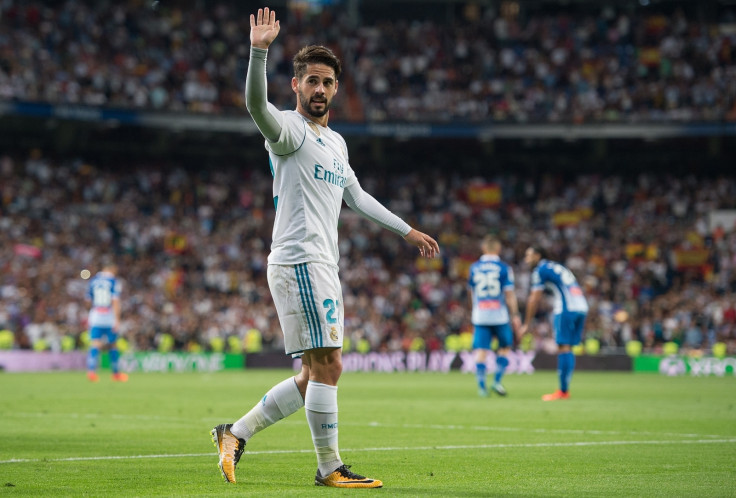Isco continues to emerge from the shadows of Cristiano Ronaldo
The Spain playmaker will arrive at next year's World Cup under pressure to lead his country to glory.

In the middle of a revolution started in 2013 by Florentino Pérez in order to fight against Barcelona's dominance, Isco Alarcón arrived at Real Madrid through the back door. Even though he was one of the most expensive Spanish signings for the club at that point, few thought that he would make such an immediate impact at the Bernabéu.
Overshadowed by the trio of Karim Benzema, Cristiano Ronaldo and Gareth Bale, who attracted all the fans and media attention, he struggled to reproduce his displays from his spell with Málaga.
Central to his lack of form was not a lack of ability or pressure, but merely his role in the team. Having yet to enhance his reputation in the Spanish capital, Isco was forced to combine his attacking instincts with defensive responsibilities. In the same way you cannot expect dribbling from Raphael Varane or goals from Keylor Navas, he was all at sea.
With Benzema, Ronaldo and Bale looking after matters in the final third, the likes of Angel Di María, Asier Illarramendi and Sami Khedira were forced into defensive roles, though a lack of balance remained.
During Rafael Benítez's tenure and even the first months of Zinedine Zidane's time in charge this became a central problem. Brazilian Casemiro soon emerged as the "easy" solution to solve the problems at the cost of losing some quality in the middle of the pitch.
Isco's story at Real shows how difficult it is for a Spanish attacking player to succeed in the club no matter how talented they are, as Álvaro Morata knows well. His first few seasons - despite Real's constant success - were not easy and this time last year he was about to leave Los Blancos.
"I will look for an alternative if I don't play more often. Leaving during the winter transfer window is not an option, I will not surrender so easily, but if by the end of the season I see that I have not played many minutes, I would like to take one step beyond and I will find an alternative for my future. I am 24 and If I am not able to succeed here, I think I can do it anywhere", he said in October 2016.
Things went no better over the next few months and before the clash against Bayern Munich in the quarter-finals of the Champions League, only one other first team player had played fewer minutes in the competition. But his fate changed dramatically against the Bavarian giants. With Bale out injured, Zidane turned to Isco as his alternative option. The 25-year-old dominated the piece and emerged as Real's most influential player during the twilight of an extremely successful season.
Since then, his offensive impact is highlighted not by his contribution, but how his presence influences others. No matter if he plays as a false nine - he scored twice against Espanyol while swapping positions with Ronaldo - or as a playmaker, he always looks to create space in the opposition half and is vital to Zidane's possession-based philosophy.
His dribbling skills with the ball, his strength, his sublime passing accuracy and his instinct in-front of goal has helped turn him into one of the most in-form players in the world, a status which was confirmed during the World Cup qualifying win over Italy.
On that night he scored a brace in a 3-0 win and La Roja's hopes of repeating their triumph from 2010 next summer in Russia rest on his young shoulders; much in the same way Andreas Iniesta and Xavi carried the team at the start of the decade. He is a total midfielder. A goal scorer, a provider and a combative individual who is not afraid of carrying the weight of the team on his shoulders.
Peformances such as the one which accompanied his double against Espanyol are no longer a surprise. Isco is Spain's stand-out player and, after so much frustration he looks determined to make the most of his moment. He is 25 and entering his prime. He may have to share leadership or Real with Ronaldo, Bale or Toni Kroos, but next summer he will lead his country.
© Copyright IBTimes 2024. All rights reserved.






